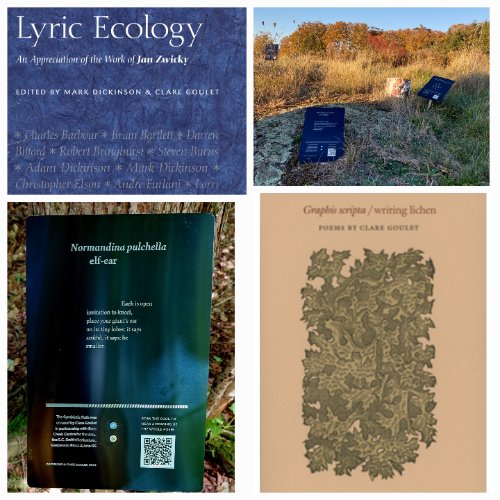
Clare Goulet
Writer of essays, poems, stories and hybrid forms; editor/consultant for academic and literary manuscripts in arts and sciences. My latest book is Graphis scripta: writing lichen (Gaspereau Press 2024). Research passions are metaphor, biopoetics, polyphony, & hybrid scholarly-creative-botanical forms.
I teach undergrad courses in creative writing and editing at the Mount, where I run its Writing Centre and collaborate with diverse partners on and off campus. First adjunct faculty to win its university-wide faculty teaching award. As an educator I aim for transformative, inclusive learning experiences.
As a British/québécoise hybrid, raised in a mixed-race family, schooled in different countries, please don’t ask me where I’m from! I survive my writing deadlines with wildly bad dancing. Total lichen obsessive.
In my writing workshops for adults and youth, I love renewing a person’s relationship to their own writing practice.
I live in Kjipuktuk/Halifax, Nova Scotia, on a road that escapes into trail and woods and ocean along the Northwest Arm.
PUBLICATIONS
Books:
Graphis scripta: writing lichen (Gaspereau 2024). Poems.
Lyric Ecology: An Appreciation of the Work of Jan Zwicky (Cormorant 2010). Contributing co-editor, with Mark Dickinson. Essays.
Book chapters:
“‘Conversations with a Toad”, in Listening for the Heartbeat of Being: the Arts of Robert Bringhurst. Eds. M. Dickinson and B. Wood (McGill-Queen’s, 2015). “Reading thisness” in Lyric Ecology (Cormorant 2010).
Poems, essays, hybrid forms and mixed-media published in Canada and abroad including in The Fiddlehead (296), Grain (50.4), Room of One’s Own (Room), Ilanot Review, The Antigonish Review, and Collateral. A poem on early Irish botanist Matilda Knowles appears in P. Whelan’s Lichens of Ireland & Great Britain.
Outdoor installation: Collaborated with the E.C. Smith Herbarium (Alain Belliveau) to create a permanent lichen-poem trail on North Mountain at Ross Creek Centre of the Arts (Chris O’Neill) in Nova Scotia.
Interviews and reviews in The Dalhousie Review, Poetry Canada Review, Atlantic Books Today, and Studies in Canadian Literature/Études en littérature canadienne.
As interviewee: WFNS “Author Spotlight”with Dea Toivonen; ”20 Questions” with rob mclennan; (mini) “Stop! Look! Listen” with The Fiddlehead; EAC Toronto “Editors Unplugged” with Jessica de Bruyn, Open Book Toronto.
Presented research on metaphor, poetics, polyphony, and creative use of AI at national teaching or research associations (ACCUTE, CASDW, CPA, CCWWP) and for the Editors’ Association of Canada.
Grateful for grants from the NS Talent Trust, WFNS Mentorship Program, Canada Council for the Arts, and Arts NS to help research, create, travel, and present.

